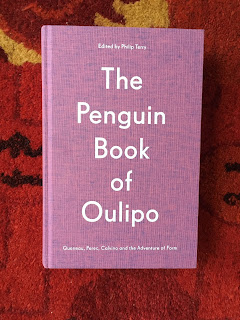Inaugural Sestina [poem]
I learned in "The Penguin Book of Oulipo" over Christmas of the sestina. It's a poetic form invented in the twelfth century with seven verses (six verses of six lines, one of three). The key rule is that the words with which the lines in the first verse end must be re-used to end the lines in every subsequent verse, with the sequence dictated by an algorithm. (All six words have to be used in the final verse.) There are rules, too, about the number of syllables and stresses per line, but these have evolved over the centuries so they're more of a guideline really.
Well. I had to have a go. I went with iambic pentameter.
Hand in hand
Well. I had to have a go. I went with iambic pentameter.
Hand in hand
I stood as
Homer’s hero on the edge
of sweeping
myths converging on a point
in time
which justice now ordained was right:
and with the
bold momentum of my line
and summoning
the strength that I had left
I entered
life – it is, at last, my turn.
What mighty quarks we are! How strange this turn
from ancient
dying star at heaven’s edge
to fleshy
mewling babe – what else is left?
Incarnate,
now, I merely have to point
my body mind
and soul along its line
towards the
life of charm that is my right.
But oh so
many paths from wrong to right!
A lattice-work
of choice – which way to turn?
I cast a
dozen dreams with which to line
the channels
weaving to the journey’s edge:
without Midsummer’s
night what is the point?
The dream is
how I choose my right or left.
Yet life
assails the dreamer from the left
and hurls
corrosive tempests from the right;
the slings
and arrows blunt my fortune’s point
until my
very soul begins to turn
away from
its commitment to the edge
towards a
weaker force, a lesser line.
Surrender
then! Embrace that chilling line!
Submit to
Nietzsche’s claim: you’ve nothing left.
The
long-gone glimpse you had of life’s sweet edge
is proven in
the wounding far from right.
This orbit
may have been your star-dust’s turn,
but nihilism
wins – and that’s the point.
Be damned. I
don’t believe there is no point.
With others,
hand in hand, I walk the line.
With lovers,
friends and family I turn
to face the
sun and claim: “We have not left
this mortal
coil without the burning right
to venture
ever-upwards to that edge.”
We beating
motes, who spin both left and right,
line-dancing
souls committed to the edge:
together we
can point and turn to home.



Comments